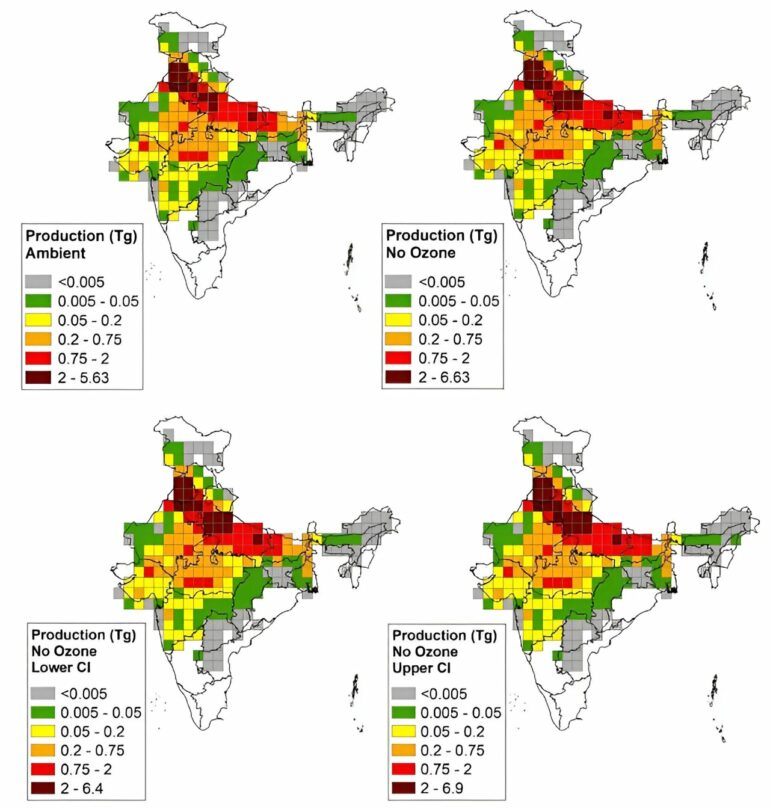Removing ozone pollution across India could boost food welfare benefits by more than four billion dollars a year through avoidance of wheat yield losses of approximately 14%, according to the results of a pioneering international study.
However, the authors of the study say the decrease in the price of food resulting from these increased yields would see both winners (consumers and government) and losers (farmers) which would require careful management of food welfare policy to equitably distribute benefits.
The study, involving researchers at the University of York, used modeling to assess the effect of such a clean-up on Indian wheat production and distribution. Using a unique combination of crop yield and economic models, they show that just the right policy is needed to reap the rewards of such a change.
Improve yields
The research, published in the Proceedings of the National Academy of Sciences, found that removing ozone pollution can quickly improve yields but that this would see decreases in food prices by 43% and subsequent reductions in the welfare of farmers.
By contrast, consumers would benefit from access to more affordable food as would the government through lower costs of food welfare programs. Overall, the food welfare benefits are substantial but policies would need to be devised that allow these benefits to be realized across the various stakeholders.
Air quality
The study took place in India because the country’s government uniquely procures and distributes wheat in an attempt to both support farmer’s livelihoods and achieve food security—especially for the country’s poorest people.
To explore the effects of air pollution mitigation on different stakeholders, the researchers simulated several policy scenarios, investigating what would happen to, for example, the income of farmers, the well-being of citizens and government budgets as the price of wheat decreased with the improvement in air quality.
Professor Lisa Emberson, from the University of York’s Department of Environment and Geography said it was clear that mitigation of air pollution caused by ozone would provide substantial benefits overall but that food welfare policy would need to be carefully managed to ensure all Indian citizens reap the benefits.
Effective support
She said, “Governments need to examine food welfare policy very carefully as policy needs to be adjusted on an ongoing basis to provide targeted and effective support to ensure that everyone benefits from increased wheat supply and lower prices.”
Dr. Divya Pandey, lead author on the study from the Leibniz Center for Agricultural Landscape Research in Germany, said, “Our combined agricultural-policy model showed that removing ozone pollution increased the production of wheat. If the government would react by fixing the amount they spend on wheat or the amount they bought, the price would then drop, hurting farmers. If the government instead fixed the price of wheat, committing to buy from farmers at that price, they would be protected from the economic loss. But, in that case, citizens do not benefit from the increased production.”
Lower prices
Dr. Cremandes, a co-author of the research, added, “This is what the study makes clear: removing ozone pollution would have considerable benefits on food welfare, but policy makers will have to carefully tweak welfare and other policies to continue to support both producers and consumers, while also benefiting from the increased supply and lower prices.”
Prof Ramaswami, an economist and co-author from Ashoka University, India added, “The interdisciplinary nature of the research is uniquely important for combining the modeling of pollution induced crop yield losses combined with a food welfare policy analysis. This type of innovative research collaboration is essential to improve our understanding of the future of food production in changing pollution climates.”
More information:
Divya Pandey et al, Assessing the costs of ozone pollution in India for wheat producers, consumers, and government food welfare policies, Proceedings of the National Academy of Sciences (2023). DOI: 10.1073/pnas.2207081120
Provided by
University of York
Citation:
Removing ozone pollution across India could boost food welfare benefits by billions of dollars a year (2023, August 1)



